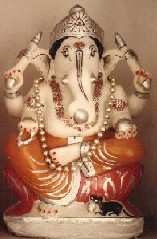 |
 |
|
 |
 |
GANESH

"To the one who removes the sorrows of the downtrodden
And is the subject of those who sing the ancient Vedas
Who is the elder son of Shiva and destroyer of the Asura's pride
Who frightens those who destroy the world
And is the jewel of heroes like Arjuna by whom he is adored
From whose face flows nectar
To this ancient timeless Gajanaana do I bow!"
Adi Shankara
As you enter the mandir hall, you come face to face with Lord Ganesh. Ganesh also known as Ganapati or Gajanaana, is the elephant-headed god, son of Lord Shiva and his consort Parvati. He is worshipped as the remover of all obstacles and the fountainhead of wisdom. He is the giver of success in all efforts and bestower of boons. Ganesh is the god of beginnings: all religious ceremonies and some civil ceremonies begin with an invocation to Ganesh as it is regarded as inauspicious to commence anything without his blessing. He is regarded as guardian of the Hindu home. Ganesh is a Puranic God and the first record of his worship dates from about 1200BC. The Puranas contain many legends about this deity; the most famous one describes how Ganesh obtained his elephant's head.
One version of the story describes how Shiva decapitated Ganesh
while Ganesh guarded the entrance to his mother Parvati's dwelling, not realising
Ganesh was his son. Parvati was so
distraught upon finding her son in this state that she threatened to destroy the heavens
and the earth. In order to appease her, Shiva decreed that the head of the first living
being found towards the north, would be the used to replace head of Ganesh. Since the
first being found
in a northern direction was an elephant, Ganesh was given the elephant's head. Another version has it
that Parvati brought her son Ganesh to show to the gods and Sani (Saturn) burnt his head to ashes.
Vishnu then found Ganesh an elephant head and breathed life back into Ganesh.The elephant head of Ganesh is said to
symbolise auspiciousness, strength and intellectual prowess. It also signifies the merger
of a small being with the greater being of God.
The Ganesh murti shows him seated, one leg dangling due to Ganesh's protruding stomach, the
latter representing the appetite for knowledge and the fact that within Ganesh lies the
entire universe. Ganesh's large elephant ears resemble fans and denote the ability to shut out vice
in words addressed to him. Ganesh holds elephant goads (ankushka) in his upper arms and a mala and mango
in his lower arms. The elephant goad signifies the Ganesh inciting man to follow the path of truth and wisdom.
The mala symbolises the importance of prayer. Ganesh also holds a sweet (modaka) in
his trunk which represents the sweetness of the inner self. Ganesh's four arms represents
the fact that he is lord of four types of beings; the creator of castes and the Vedas. The broken
tusks on the murti are owing to Ganesh's breaking his tusks to fight with a demon and to pen the
Mahabharata as recited by the sage Vyasa. His broken tusks are said to represent maya or illusions.
At the base of the murti, is a mouse which is Ganesha's vehicle for traversing the universe.
The mouse represents the desires of men which nibble away at the truth.
Ganesh is worshipped as a Brahmachari or celibate but Siddhi (success) and Riddhi
(prosperity) are regarded by some as his spiritual consorts. It is believed that one who
obtains the blessings of Ganesh also obtains the blessings of Siddhi and Riddhi.
Ganesh is one of Hinduism's most popular and loved gods.
Mantras
Ashtaakshara Mantra
Om Shri Ganeshaaya Namah
Ekaakshava Mantra
Om Gam Ganapataye Namah
Sloka
Vakra thunda Mahakaya
Suryakoti Samaprabha
Nirvingam kurumedeva
Sarvakaryeshu sarvada
Translation:
You of twisted trunk and massive body
with the dazzle of light of millions of suns
lead me on a path that has no obstacles nor hindrances
clearing the way in all that I do ever and always